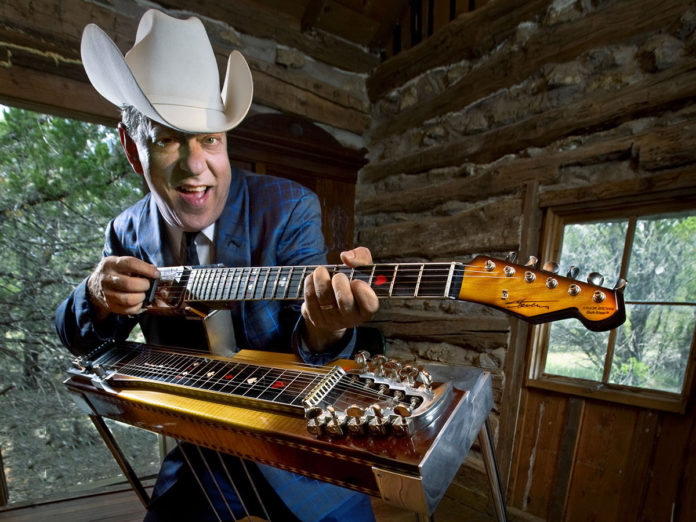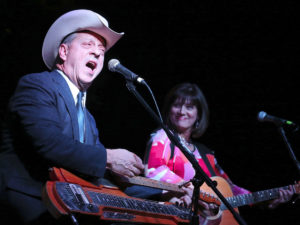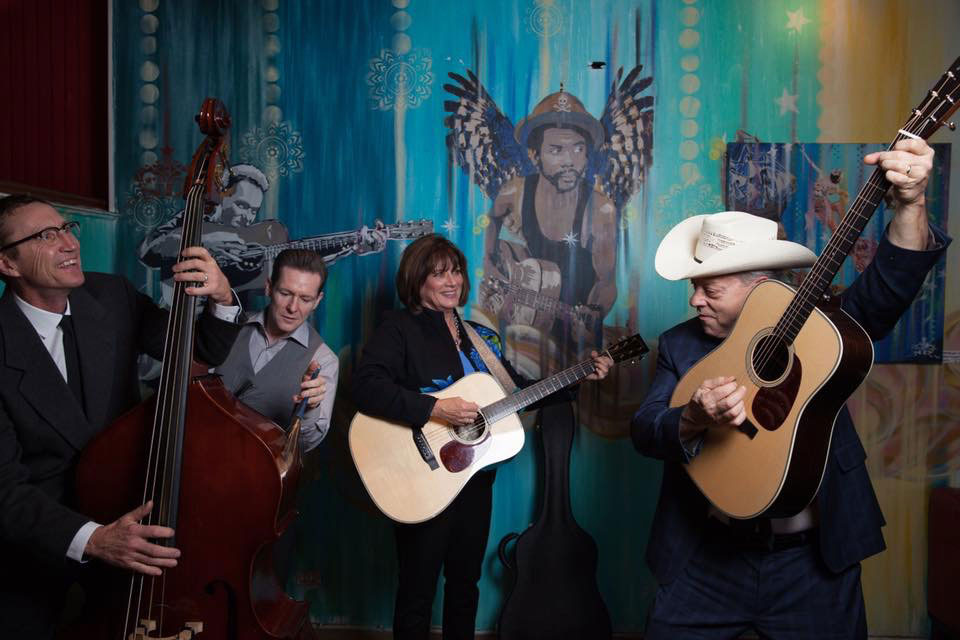
When Junior Brown rolls into Healdsburg on Saturday for his show at the Raven, it will be the first time the performer plays the Raven Theater. That’s a surprise: One might think that like any good ol’ truck driving cowboy, “he’s been everywhere.”
“They say I gotta be half crazy to be doing what I do
I’m a slap-happy, gear-jamming, coffee-drinking, truck-driving fool …”
That’s “Semi-Crazy,” his 1996 single and album that went full throttle down the highway toward the niche stardom for the fretboard whiz and baritone showman.
His first album, the now-hard-to-find 12 Shades of Brown, has attained legendary status as an essential New Wave record. It was released in 1990 in the U.K. by Demon Records, a label co-owned by Elvis Costello.

Then his second CD broke through with a remake of Red Simpson’s 1966 “Highway Patrol,” which while not technically a truck song, sure carries the vibe. (“I got a star on my car and one on my chest / A gun on my hip and the right to arrest …”)
So naturally, our first question to him was if he had ever been stopped by the Highway Patrol.
He laughed and said, “Yeah, I’ve been pulled over by highway patrol and then city police and county police and sheriff and everybody else.”
Why? One can hear the shrug over the phone. “Just, you know, speeding. Little things like that.”
Guit-Steel
At center stage, along with the cowboy-hatted singer-songwriter whose name is on the bus, is the instrument he plays. Or instruments: Though double-neck guitars are not unheard of—local blues favorite Roy Rogers plays one—this one is something different.
There’s a Fender neck on top and a lap-steel fretboard on the bottom, set on a stand so Brown can play both in the same song. He calls it a guit-steel, pronounced like it sounds. It was fashioned by Michael Stevens of Alpine, Texas, formerly chief design engineer of Fender Custom.
“I came up with it because I played guitar and steel guitar, and I didn’t want to have to unplug one and plug into another one on stage. It’s just a big hassle,” he told the Tribune in a recent phone conversation.
With Junior Brown on his guit-steel, the audience gets two for the price of one.
As prominent as his primary instrument was, the original was nonetheless stolen during a tour stop in Massachusetts, in 2019—along with Tanya’s blonde Martin Shenandoah. Both instruments had their names and personal markings, so they’d be difficult to sell in any legal market. But they were never recovered.
It begs the question, who in their right mind would steal a distinctive instrument from a well-known performer? “Well, there’s a lot of people out there that aren’t in their right mind,” Brown said.
Right Place, Right Time

Brown, now 72, started playing the guit-steel when crafting his own career as a solo artist. He hit his stride in Austin, Texas. “My wife Tanya and I were just kind of moving around. We tried living in several places trying to get a musical thing going,” he said. “I had played in Austin and lived down there for quite a while. So I thought, well, let’s just try Austin.”
In the right place at the right time, they became the house band at the Continental Club on South Congress. Ever since the mid-1970s, Austin has been the center of the counterculture country community at loud variance to much of the rest of Texas. And the Continental was the club to play.
Brown found that the city offered something rare for a road musician. “I think because of the intimacy of those clubs, people would come in and they would listen to the songs,” he said. “Singer-songwriters were big because people would listen to what the songwriter was trying to say.
“Other towns not so much. You’re more of a dance band or something,” he added, his low voice resigned to a journeyman’s fate.
As Brown built his repertoire, he leaned into one influence that some might find surprising: surf guitar. The highlight of his set has long been his seven-minute medley of “Pipeline,” “Walk Don’t Run” and, of all things, the “Secret Agent” theme song.

“I like that twangy surf-style guitar and other people seemed to enjoy to hear me do it,” he said. “I’m thinking, actually, of putting out an album of that style of music. I’ve been enjoying it since way back before the Beatles came along.”
Then there’s his voice. The first track on his first album was “My Baby Don’t Dance to Nothing But Ernest Tubb,” and if that’s true Tanya Rae must be doing a lot of dancing. Tubb (“Walking the Floor Over You”) is a clear influence on Brown’s vocal style, rolling over the lower registers with an easy gait, at once sincere with a touch of wry.
Junior Brown is the real deal. A double-threat on guitars, a singer rooted in the classic sound and a performer who delivers. Expect him to deliver Saturday night at the Raven at 8pm.








